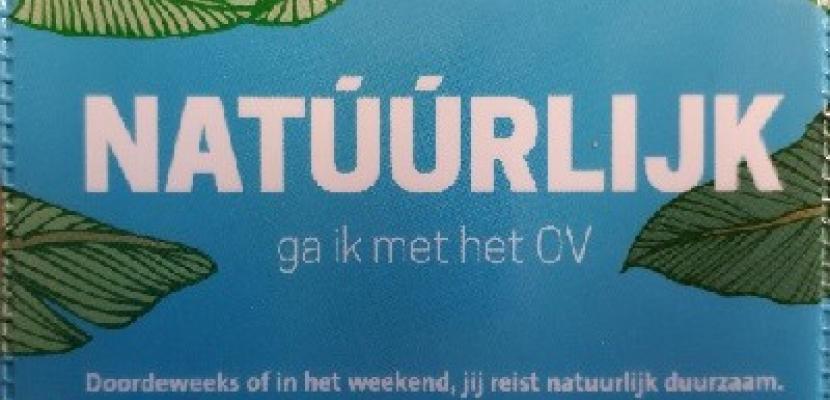Image

Nudging experiment: testing whether social labelling can increase bus use
Published on 29 January 2020

Netherlands
Zuid-Holland
This is the good practice's implementation level. It can be national, regional or local.
About this good practice
A field experiment was realized in Rotterdam aiming to investigate whether nudging and social labeling can be an effective method in the field of public transport towards the increase of bus use by the citizens.
The design of the field experiment was: During peak hours in one working week, free travel card holders were distributed to approximately 4000 bus passengers on six bus lines (reaching about 6% of all passengers during that period). Passengers of 3 specific bus lines received the experimental version of the holder which labelled passengers as environmentally friendly individuals with the following message on it: “Naturally, I use public transport. During the week or in the weekends, naturally you travel sustainably”. In Dutch, the word “naturally” is a very common word for ‘of course’ and it makes a strong reference to nature. Also, this holder had drawings of green tree leafs printed on a blue background reminding of an image of Earth from space. The control version of the other 3 bus lines was a regular travel card holder without a message and without a nature-related design on it.
A pre/post-intervention short survey on environmental attitudes was carried out one week before and after handing out the travel card holders. Bus use was measured through the available bus payment records that are created when people validate the bus pass for their ride. The unit of analysis was the number of passengers on a particular bus line in one hour of a certain day.
The design of the field experiment was: During peak hours in one working week, free travel card holders were distributed to approximately 4000 bus passengers on six bus lines (reaching about 6% of all passengers during that period). Passengers of 3 specific bus lines received the experimental version of the holder which labelled passengers as environmentally friendly individuals with the following message on it: “Naturally, I use public transport. During the week or in the weekends, naturally you travel sustainably”. In Dutch, the word “naturally” is a very common word for ‘of course’ and it makes a strong reference to nature. Also, this holder had drawings of green tree leafs printed on a blue background reminding of an image of Earth from space. The control version of the other 3 bus lines was a regular travel card holder without a message and without a nature-related design on it.
A pre/post-intervention short survey on environmental attitudes was carried out one week before and after handing out the travel card holders. Bus use was measured through the available bus payment records that are created when people validate the bus pass for their ride. The unit of analysis was the number of passengers on a particular bus line in one hour of a certain day.
Expert opinion
Nudging is an increasingly important field of interest for policy-makers, building upon behavioural science, with the aim of creating low-cost and non-invasive interventions which can have a significant impact on behaviour. This is an interesting trail with modest success – but an almost 1% increase in bus use from a low-cost measure such as demonstrates potential – applied to a full city transport system, it could have significant benefits. The measure could even become more impactful with a longer duration as more people absorb the messaging and view bus journeys as an eco-measure.
Works at
Interreg Europe Policy Learning Platform
Resources needed
There are no extra resources needed. The only necessary action is, instead of printing the regular plain travel card, to print the new cards with a nature related image on it and an inspiring labelled message. Then they are distributed to public transport users normally.
Evidence of success
A test carried out showed that the social label increased people’s perceptions of themselves as environment-friendly individuals.
After a model-based analysis and controlling factors that affect bus use (summer, weekday, hour of day, etc.), it was concluded that this practice led to 2,86 extra passengers per hour. Post- minus pre-intervention bus use was 0.89% higher on bus lines that received the environmentally friendly travel card holder than on bus lines that received the standard one.
After a model-based analysis and controlling factors that affect bus use (summer, weekday, hour of day, etc.), it was concluded that this practice led to 2,86 extra passengers per hour. Post- minus pre-intervention bus use was 0.89% higher on bus lines that received the environmentally friendly travel card holder than on bus lines that received the standard one.
Potential for learning or transfer
The results of this field experiment demonstrate that a relatively cheap intervention, built on insights from academic consumer research, can effectively produce behavioral change in the real world and allow public transport operators and authorities to effectively increase their market share.
This practice proves that even the smallest action like this (adding a labelled image and a motivated message on the standard travel card holder, can be the first step to apply social labelling and try to influence citizens behavior. Supplementary promotional activities could multiply the result and achieve better data.
This practice proves that even the smallest action like this (adding a labelled image and a motivated message on the standard travel card holder, can be the first step to apply social labelling and try to influence citizens behavior. Supplementary promotional activities could multiply the result and achieve better data.
Further information
Website
Good practice owner
You can contact the good practice owner below for more detailed information.
Organisation
Aristotle University of Thessaloniki

Greece
Kentriki Makedonia
Contact
Research Associate
